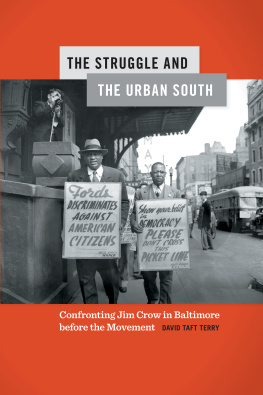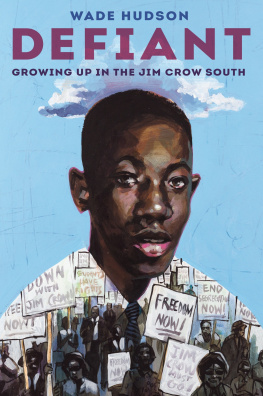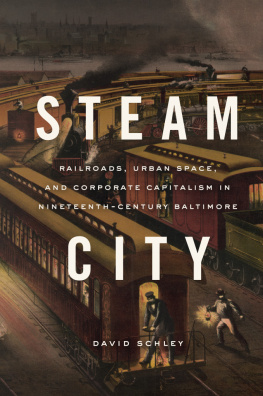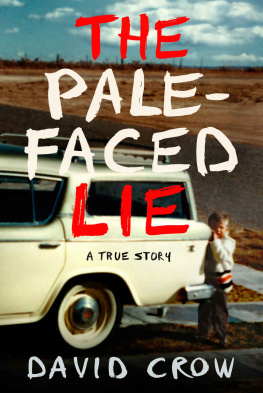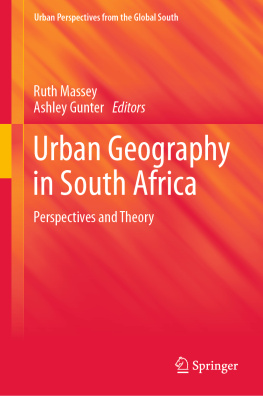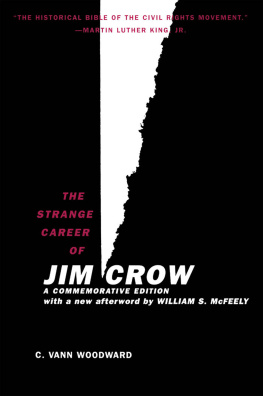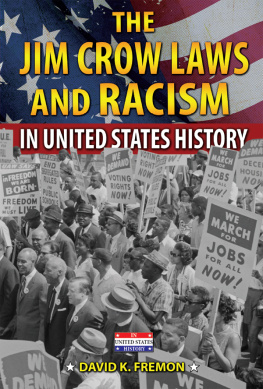The Struggle and the Urban South
SERIES EDITORS
Bryant Simon, Temple University
Jane Dailey, University of Chicago
ADVISORY BOARD
Lisa Dorr, University of Alabama
Grace Elizabeth Hale, University of Virginia
Randal Jelks, University of Kansas
Kevin Kruse, Princeton University
Robert Norrell, University of Tennessee
Bruce Schulman, Boston University
Marjorie Spruill, University of South Carolina
J. Mills Thornton, University of Michigan
Allen Tullos, Emory University
Brian Ward, University of Manchester
2019 by the University of Georgia Press
Athens, Georgia 30602
www.ugapress.org
All rights reserved
Set in 10.25/13.5 Minion Pro by Graphic Composition, Inc. Bogart, GA.
Most University of Georgia Press titles are
available from popular e-book vendors.
Printed digitally
Library of Congress Cataloging-in-Publication Data
Names: Terry, David Taft, author.
Title: The struggle and the urban South : confronting Jim Crow in Baltimore before the
movement / David Taft Terry.
Other titles: Politics and culture in the twentieth-century South.
Description: Athens : The University of Georgia Press, [2019] | Series: Politics and culture in
the twentieth-century South | Includes bibliographical references and index.
Identifiers: LCCN 2018049584| ISBN 9780820355078 (hardcover : alk. paper) |
ISBN 9780820355085 (ebook)
Subjects: LCSH: African AmericansSegregationMarylandBaltimore. | Baltimore
(Md.)Race relationsHistory20th century. | African AmericansCivil rights
MarylandBaltimoreHistory20th century. | Civil rights movementsMaryland
BaltimoreHistory20th century.
Classification: LCC F189.B19 N478 2019 | DDC 323.1196/073075260904dc23
LC record available at https://lccn.loc.gov/2018049584
For you, Pop
In my dreams I can see your face again
ACKNOWLEDGMENTS
This work draws from a doctoral dissertation completed at Howard University in 2002. Between its completion as a dissertation and the moment I decided to return to academia and prepare this for publication were more than a dozen rewarding years spent professionally at archives and museums, working in public history capacities. During those years, I never lost the passion that brought me to the topic in graduate school. And surely, as I spent many semesters as a part-time adjunct at colleges and universities while supporting a growing family at home, the material represented herein found its way into lectures and justified my continued curiosity, research trips, and presentation of papers. I have truly lived with this work and am honored to share it now. That said, I remain indebted to all of those who gave their time, energy, and consideration to this project in all of its iterations along the way, and I mention only a few here whose efforts on my behalf I will not forget.
My colleagues at Morgan State University have been consistently supportive and encouraging. Particular thanks are extended to the chair of the Department of History and Geography, Annette Palmer, for allowing the time and latitude needed to complete this work. Also at Morgan, I single out these colleagues for particular thanks for their contributions: Glenn O. Phillips, Debra Newman Ham, Brandi C. Brimmer, Takkara Brunson, Frances Dube, and Natanya Duncan. Morgan colleagues Rosalyn Terborg-Penn, Susan Ellery Chapelle, Jeremiah Dibua, Brett Berliner, and Larry Peskin have offered support and feedback on presentations of parts of the chapters herein.
At former posts, colleagues have been aware of my research interest and allowed me to explore them whenever appropriate to the scope of my duties. As such, to Edward C. Papenfuse and the staff of the Maryland State Archiveswith special gratitude for Chris Haley and Robert SchoeberleinI say thank you. Likewise, my thanks go to my former colleagues in the Department of Collections and Exhibitions at the Reginald F. Lewis Museum of Maryland African American History and CultureKathryn Coney, Christina Batipps, and Margaret Hutto. Some of the interpretive positions I take up in this book began life as conversations at the museum about exhibit scripts and collection priorities concerning Baltimore civil rights history.
The staffs of several institutions and research facilities made solid contributions to my work, and I wish to acknowledge them here: the Western High School (Baltimore City) Alumni Association; the Library and Special Collections staffs at the Maryland Historical Society; the Baltimore City Archives; the African-American Department and the Maryland Room at Enoch Pratt Free Library, Baltimore; the Manuscripts Division, Library of Congress; the Manuscript Division of the Moorland-Spingarn Research Center, Howard University; King Center Library and Archives; the Beulah M. Davis Special Collections Room, Morgan State University; the Special Collections Department, University of Maryland at College Park; and the Afro American Newspapers Archives and Research Center, Baltimore.
Special thanks to all of the wonderful individuals who shared parts of their fascinating life stories with me to help me see Baltimore as they did: Anastatia Phillips Benton, Leroy Carroll, Carl Clark, Carolyn A. Collins, Aubrey Edwards, Natalie Forrest, Gene A. Giles, Lynda Hall Gowie, Delores Richburg Harried, Garry Harried, Rosalie Carter Hillman, Donna Tyler Hollie, Ann Todd Jealous, Clarence Logan, Michael May, Jamie McClellan, Judy Bernstein Miller, Keiffer J. Mitchell, Thelma Koger Parker, Nathaniel Redd, Carol St. Clair, Doug Sands, Judith Spintman, Calla Smorodin, Mamie Bland Todd, McAllister Tyler, and Patricia Logan Welsh.
Formal and informal feedback from historians in the field and subject experts has also been useful and welcome, and so I thank Larry S. Gibson, Sherrilyn Ifill, Matthew Crenson, Garrett Power, Susan Carle, Bob Brugger, Prudence Cumberbatch, Lewis Diuguid, Eli Pousson, Andor Skotnes, Howell Baum, Vivian Fisher, Helena Hicks, John Oliver, Frances Murphy, and Sam Lacy.
To friends and colleagues whose conversations over the years helped me to see the material more clearly, I say thanks. Your kindnesses will not be forgotten. These include Joy L. Bailey, Jabari Asim, Wil Haygood, Judi M. Latta, Sonja Williams, Jana Long, John Gartrell, Leslie Gartrell, Tamara L. Brown, Jelani Cobb, and Ida Jones.
I am also deeply indebted to Walter Biggins and the editorial staff of the University of Georgia Press. Because of their patience and professionalism, the publishing process has been a wonderful experience for me.
Finally, I wish to thank my wonderful family for supporting me and understanding what has been a journey of sorts. To my wife and partner, Alisia, and to our beautiful, inspiring children, David and Grace, I say thank you for your love, which means the world to me.

